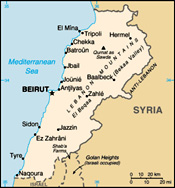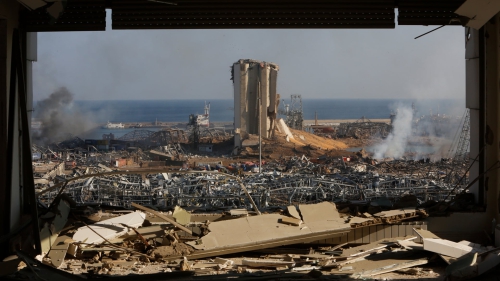Washington's dangerous game in Lebanon
 |
Once again, the Bush administration is playing a dangerous game in the Levant without realizing either the potential long-term costs of its gamble - human and strategic - or the possibility of a more intelligent alternative.
The most recent gamble in Lebanon, of course, was to encourage - some say demand - that Israel pursue its broadly destructive 33-day war against Hezbollah (and Lebanon) in July 2006. Now, Lebanon is again front and center on the chessboard, with a concerted decision by the alliance of pro-US parties (the March 14 group) to use what remains of "state power" to directly challenge Hezbollah on the core issue of its independent military power. The challenge, which came following a series of meetings between March 14 leaders and US officials, is being posed primarily as an issue about Hezbollah's long-acknowledged and tacitly-accepted private communications network. But as Hezbollah leader Sayyed Hassan Nasrallah made clear Thursday, and as March 14 leaders know all too well - the party's telecom system is at the heart of its military strategy. Indeed, it was the main reason why Hezbollah was able to maintain an unprecedented level of coordination during the 2006 war.
The March 14 group seems on the surface to have clearly and dramatically announced its willingness to effect a "strategic shift in dealing with Hezbollah", as one writer in the pro-March 14 paper, Al-Mustaqbal, put it Thursday.
But is such a shift really in process to the extent that it might seem? And perhaps more importantly, have March 14 and its US allies correctly calculated that a limited level of violence, strongly sectarian in character, is (a) possible to maintain while avoiding outright chaos and (b) strong enough to finally drive a fatal political wedge between the Lebanese Shiites and their Christian supporters?
Using the telecom issue, as well as allegations of cameras overlooking Beirut airport, as instruments to isolate Hezbollah, to draw contrasts with the March 14 alliance and indeed to frighten Lebanese citizens broadly with the prospect that they could "perhaps" be targeted (as March 14's Walid Jumblatt put it), is at face value a smart strategy; especially in advance of parliamentary elections next year, the ongoing push to finally elect a president and recent defections among key opposition-aligned Christians.
But the problem with this is the army, as its commander made clear Thursday, will not and indeed cannot intervene on behalf of March 14 to carry out "state" decisions - especially those that Hezbollah has declared as integral to its military capacity and protected by an earlier "state" acknowledgement of its right to retain weapons.
Thus the balance of power (as was the case in Gaza) rests with the opposition as a whole, and Hezbollah specifically. What one is left with then is the admittedly early impression that March 14, undoubtedly encouraged by the US, calculated that Hezbollah and the opposition would not effect an outright coup d-etat over the issues at stake, as in Gaza (something that would greatly undermine the legitimacy of "the resistance"), and that it would also work, as it has at critical moments, to contain sectarian violence between Sunnis and Shiites.
In other words, there would be no need to project too much power on the streets, and March 14 would have succeeded in "wedging" the opposition further. Betting on that, however, makes perfect sense only if March 14 provided enough room for a compromise that might preserve some of its ostensible gains while allowing Hezbollah to remove its forces honorably from the field - March 14 having made its point to the Lebanese over "state sovereignty" and the "dangers" of Hezbollah. But its hard-line directives has provided no such room. Instead it has made the issues about force - a position which March 14, and the US for that matter, is ill equipped to be in at the present time. Indeed, it is highly unlikely that either the United Nations forces in Lebanon or March 14's US allies, already stretched thinly because of Iraq and Afghanistan, might intervene to improve the balance of power for March 14.
The open question then, as it has been for the last 30 years, now seems to be whether the Israelis might be the ones to intervene if March 14 steadily loses its capacity to cling on to its remaining levers of power - or whether Israel might be content to sit back and watch its bitter enemy fight its own countrymen.
Related Suggestions
Now that Olmert is on his way out and Bush is also on his way out, I think Israelis will sit back and watch the slaugther of Lebanese killing themselves; Israel/US might even sell them arms -- well, that is business folks; war is good business for some people.
When are Arabs going to learn to live peacefully among themselves and have a stable government, so that no outsider can take advantage of them? That will be asking for too much. The rift among Arabs is not Israeli/US creation; they precede birth of US and Israel. Israel/US merely take advantage of it. US/Israel is not run by saints; it is run by human beings.
Is CNN going to broadcast the whole show? CNN can make money out of it too.

















